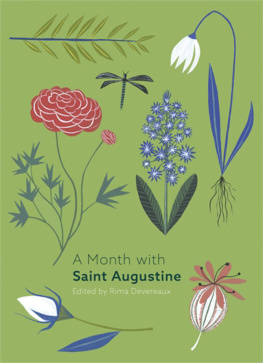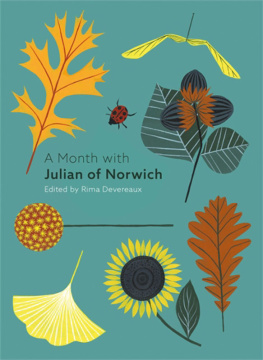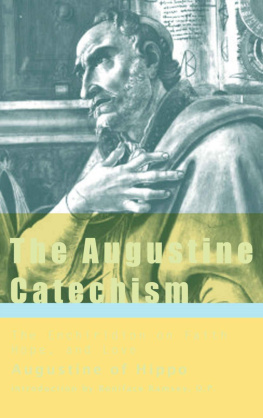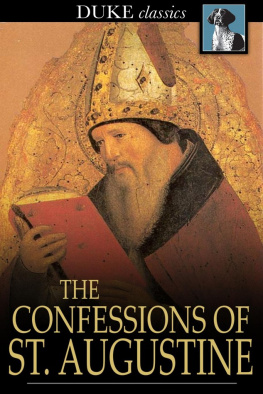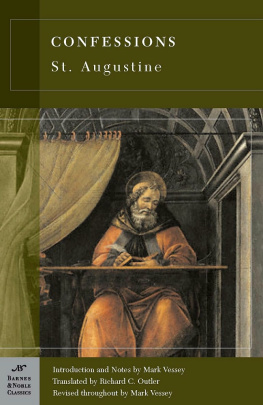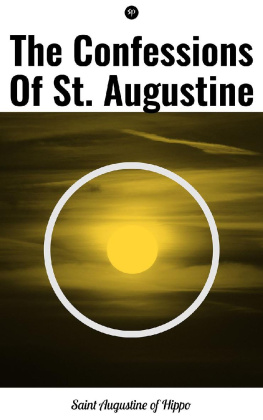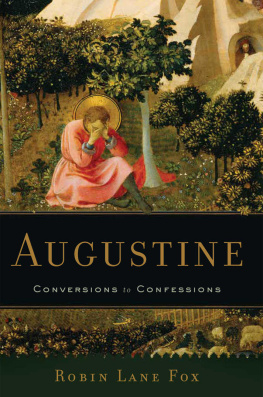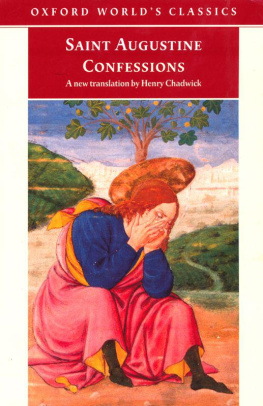
A Month with 
St Augustine
Edited by Rima Devereaux


Introduction
St Augustine (354430) was born in North Africa, the son of St Monica. Despite having been brought up as a Christian, in his youth he was devoted to the pursuit of pleasure and was attracted to the Manichaean heresy, which views the world as a battleground between the forces of light and darkness. His conversion at the age of 33 in a garden in Milan marked the turning point of his life. He heard a child singing Take up and read, and felt that God was asking him to take up the letters of St Paul. He went on to become a priest, bishop, writer and Doctor of the Church.
Most of the extracts in this devotional are taken from the Confessions , which Augustine probably wrote when he was 43. His motivation for writing might have been to allay his contemporaries suspicions of his pagan-influenced education. The book is confessional in three senses: it is an account of his sins, a statement of Christian faith and a work praising God. It contains extended prayers that encompass such movements of the heart as repentance, love and thanksgiving, and give a sense of the mystery and mercy of God.
The Confessions is rightly praised as a masterpiece of literature:
The work has a perennial power to speak, even though written virtually sixteen centuries ago... The contemporary reader today may find much of it so modern that at times it is a shock to discover how very ancient are the presuppositions and the particular context in which the author wrote.
The book gives a powerful sense of salvation history: Like other Fathers of the Church, Augustine was vividly conscious of the entire mystery of salvation as embodied in a story that runs from Genesis to Revelation but still continues. He was himself caught up in it. Across the centuries, Augustine invites the modern reader to a fresh conversion and a rediscovery of the roots of Christian faith.
A Month with
St Augustine

Morning
You are great, O Lord, and greatly to be praised; your power is great, and your wisdom infinite... You awake us to delight in your praise; for you made us for yourself, and our heart is restless until it rests in you. Grant me, Lord, to know and understand which is first, to call on you or to praise you; and, again, to know you or to call on you. For who can call on you, not knowing you? For the one that does not know you may call on you as someone other than you are. Or is it rather that we call on you so that we may come to know you?... Those who seek the Lord shall praise him: for those who seek shall find him, and those who find shall praise him.

Evening
What are you then, my God? What, but the Lord God? For who is Lord but the Lord? Or who is God save our God? Most high, most good, most mighty, most powerful; most merciful, yet most just; most hidden, yet most present; most beautiful, yet most strong; stable, yet incomprehensible; unchangeable, yet all-changing; never new, never old; all-renewing and bringing age upon the proud without their knowing it; ever working, ever at rest; still gathering, yet lacking nothing; supporting, filling and overspreading; creating, nourishing and maturing; seeking, yet having all things.

Morning
In boyhood itself, however... I did not love studying, and hated being forced to it. Yet I was forced; and this was well done for me, though not by my will; for, unless forced, I would not have learnt. But no one does well unwillingly, even though what is done may be done well. Yet neither did those who forced me do well, but what was done well came to me from you, my God. For they did not consider how I should employ what they forced me to learn, except to satiate the insatiable desires of a wealthy beggary, and a shameful glory. But you, by whom the very hairs of our head are numbered, did use for my good the error of all who urged me to learn.

Evening
Yet, Lord, to you, the Creator and Governor of the universe, most excellent and most good, thanks were due to you our God, even if you had destined me for boyhood only. For even then I was, I lived, and felt; and had an implanted providence over my well-being a trace of that mysterious Unity from which I was derived; I guarded by the inward sense the entireness of my senses, and in these small pursuits, and in my thoughts on small things, I learnt to delight in truth, I hated to be deceived, had a vigorous memory, was gifted with speech, was soothed by friendship, and avoided pain, baseness and ignorance.

Morning
And what was it that I delighted in, but to love and be loved? But I did not keep the measure of love, of mind to mind, friendships bright boundary: but out of the muddy lust of the flesh and the bubblings of youth, mists fumed up which beclouded and overcast my heart, so that I could not distinguish the clear brightness of love from the fog of lustfulness... Your wrath had gathered over me, and I did not know it. I was grown deaf by the clanking of the chain of my mortality, the punishment of the pride of my soul, and I strayed further from you, and you let me alone, and I was tossed about, and wasted, and dissipated, and I boiled over in my fornications, and you held your peace, O you my tardy joy!

Evening
For there is an attractiveness in beautiful bodies, in gold and silver, and all things; and in bodily touch, sympathy has much influence, and each other sense has its proper object answerably tempered. Worldly honour also has its grace, and the power of overcoming, and of mastery, from which springs also the thirst of revenge. But yet, to obtain all these, we may not depart from you, O Lord, nor decline from your law. The life also which we live here has its own enchantment, through a certain proportion of its own and a correspondence with all things beautiful here below. Human friendship also is prized for the warm ties that bind many souls together in unity.

Morning
And so I fell among people, arrogant ranters, full of low talk, in whose mouths were the snares of the devil, limed with a mixture of the syllables of your name, and of our Lord Jesus Christ, and of the Holy Spirit, the Paraclete, our Comforter. These names departed out of their mouth as far as the sound only and the noise of the tongue, for the heart was void of truth. Yet they cried out Truth, Truth and spoke much of this to me, yet it was not in them: but they spoke falsehood, not of you only (who truly are Truth), but even of those elements of this world, your creatures.
Next page
